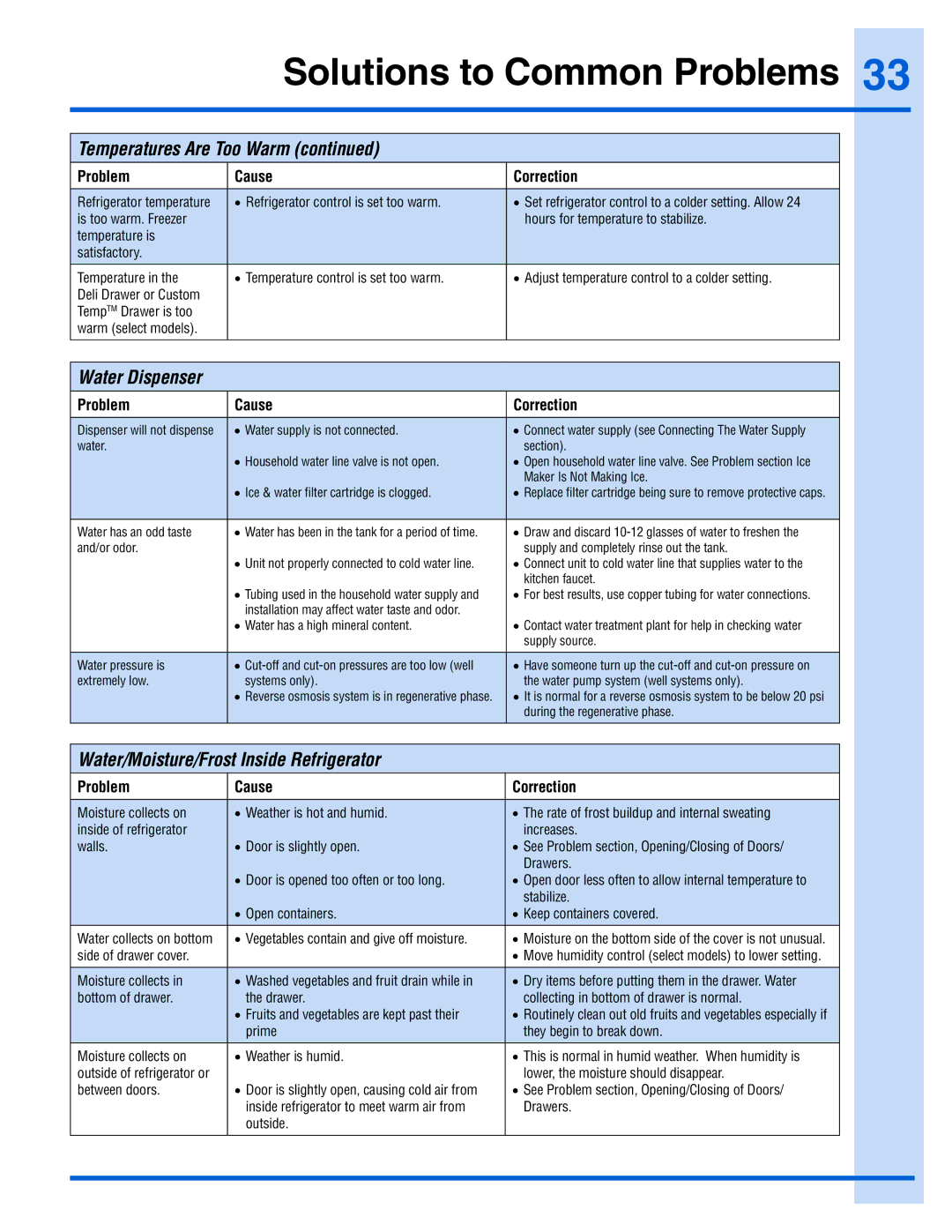
Solutions to Common Problems 33
Temperatures Are Too Warm (continued)
Problem | Cause | Correction |
|
|
|
Refrigerator temperature | • Refrigerator control is set too warm. | • Set refrigerator control to a colder setting. Allow 24 |
is too warm. Freezer |
| hours for temperature to stabilize. |
temperature is |
|
|
satisfactory. |
|
|
|
|
|
Temperature in the | • Temperature control is set too warm. | • Adjust temperature control to a colder setting. |
Deli Drawer or Custom |
|
|
TempTM Drawer is too |
|
|
warm (select models). |
|
|
|
|
|
Water Dispenser
Problem | Cause | Correction |
|
|
|
Dispenser will not dispense | • Water supply is not connected. | • Connect water supply (see Connecting The Water Supply |
water. |
| section). |
| • Household water line valve is not open. | • Open household water line valve. See Problem section Ice |
|
| Maker Is Not Making Ice. |
| • Ice & water filter cartridge is clogged. | • Replace filter cartridge being sure to remove protective caps. |
|
|
|
Water has an odd taste | • Water has been in the tank for a period of time. | • Draw and discard |
and/or odor. |
| supply and completely rinse out the tank. |
| • Unit not properly connected to cold water line. | • Connect unit to cold water line that supplies water to the |
|
| kitchen faucet. |
| • Tubing used in the household water supply and | • For best results, use copper tubing for water connections. |
| installation may affect water taste and odor. |
|
| • Water has a high mineral content. | • Contact water treatment plant for help in checking water |
|
| supply source. |
|
|
|
Water pressure is | • | • Have someone turn up the |
extremely low. | systems only). | the water pump system (well systems only). |
| • Reverse osmosis system is in regenerative phase. | • It is normal for a reverse osmosis system to be below 20 psi |
|
| during the regenerative phase. |
|
|
|
Water/Moisture/Frost Inside Refrigerator
Problem | Cause | Correction |
|
|
|
|
|
Moisture collects on | • Weather is hot and humid. | • The rate of frost buildup and internal sweating | |
inside of refrigerator |
| increases. | |
walls. | • Door is slightly open. | • See Problem section, Opening/Closing of Doors/ | |
|
| Drawers. | |
| • Door is opened too often or too long. | • Open door less often to allow internal temperature to | |
|
| stabilize. | |
| • Open containers. | • Keep containers covered. | |
|
|
|
|
Water collects on bottom | • Vegetables contain and give off moisture. | • Moisture on the bottom side of the cover is not unusual. | |
side of drawer cover. |
| • Move humidity control (select models) to lower setting. | |
|
|
|
|
Moisture collects in | • Washed vegetables and fruit drain while in | • Dry items before putting them in the drawer. Water | |
bottom of drawer. | the drawer. | collecting in bottom of drawer is normal. | |
| • Fruits and vegetables are kept past their | • Routinely clean out old fruits and vegetables especially if | |
| prime | they begin to break down. | |
|
|
|
|
Moisture collects on | • Weather is humid. | • This is normal in humid weather. When humidity is | |
outside of refrigerator or |
| lower, the moisture should disappear. | |
between doors. | • Door is slightly open, causing cold air from | • See Problem section, Opening/Closing of Doors/ | |
| inside refrigerator to meet warm air from | Drawers. | |
| outside. |
|
|
|
|
|
|
|
|
|
|
